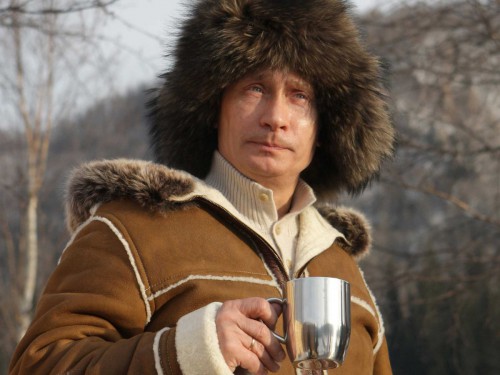You might think that policymakers with so many bloody fiascos on their résumés as the U.S. neocons, including the catastrophic Iraq War, would admit their incompetence and return home to sell insurance or maybe work in a fast-food restaurant. Anything but directing the geopolitical decisions of the world’s leading superpower.
But Official Washington’s neocons are nothing if not relentless and resilient. They are also well-funded and well-connected. So they won’t do the honorable thing and disappear. They keep hatching new schemes and strategies to keep the world stirred up and to keep their vision of world domination – and particularly “regime change” in the Middle East – alive.
Now, the neocons have stoked a confrontation over Ukraine, involving two nuclear-armed states, the United States and Russia. But – even if nuclear weapons don’t come into play – the neocons have succeeded in estranging U.S. President Barack Obama from Russian President Vladimir Putin and sabotaging the pair’s crucial cooperation on Iran and Syria, which may have been the point all along.
Though the Ukraine crisis has roots going back decades, the chronology of the recent uprising — and the neocon interest in it – meshes neatly with neocon fury over Obama and Putin working together to avert a U.S. military strike against Syria last summer and then brokering an interim nuclear agreement with Iran last fall that effectively took a U.S. bombing campaign against Iran off the table.
With those two top Israeli priorities – U.S. military attacks on Syria and Iran – sidetracked, the American neocons began activating their influential media and political networks to counteract the Obama-Putin teamwork. The neocon wedge to splinter Obama away from Putin was driven into Ukraine.
Operating out of neocon enclaves in the U.S. State Department and at U.S.-funded non-governmental organizations, led by the National Endowment for Democracy, neocon operatives targeted Ukraine even before the recent political unrest began shaking apart the country’s fragile ethnic and ideological cohesion.
Last September, as the prospects for a U.S. military strike against Syria were fading thanks to Putin, NED president Carl Gershman, who is something of a neocon paymaster controlling more than $100 million in congressionally approved funding each year, took to the pages of the neocon-flagship Washington Post and wrote that Ukraine was now “the biggest prize.”
But Gershman added that Ukraine was really only an interim step to an even bigger prize, the removal of the strong-willed and independent-minded Putin, who, Gershman added, “may find himself on the losing end not just in the near abroad [i.e. Ukraine] but within Russia itself.” In other words, the new hope was for “regime change” in Kiev and Moscow.
Putin had made himself a major annoyance in Neocon World, particularly with his diplomacy on Syria that defused a crisis over a Sarin attack outside Damascus on Aug. 21, 2013. Despite the attack’s mysterious origins – and the absence of any clear evidence proving the Syrian government’s guilt – the U.S. State Department and the U.S. news media rushed to the judgment that Syrian President Bashar al-Assad did it.
Politicians and pundits baited Obama with claims that Assad had brazenly crossed Obama’s “red line” by using chemical weapons and that U.S. “credibility” now demanded military retaliation. A longtime Israeli/neocon goal, “regime change” in Syria, seemed within reach.
But Putin brokered a deal in which Assad agreed to surrender Syria’s chemical weapons arsenal (even as he continued to deny any role in the Sarin attack). The arrangement was a huge letdown for the neocons and Israeli officials who had been drooling over the prospect that a U.S. bombing campaign would bring Assad to his knees and deliver a strategic blow against Iran, Israel’s current chief enemy.
Putin then further offended the neocons and the Israeli government by helping to facilitate an interim nuclear deal with Iran, making another neocon/Israeli priority, a U.S. war against Iran, less likely.
Putting Putin in Play
So, the troublesome Putin had to be put in play. And, NED’s Gershman was quick to note a key Russian vulnerability, neighboring Ukraine, where a democratically elected but corrupt president, Viktor Yanukovych, was struggling with a terrible economy and weighing whether to accept a European aid offer, which came with many austerity strings attached, or work out a more generous deal with Russia.
There was already a strong U.S.-organized political/media apparatus in place for destabilizing Ukraine’s government. Gershman’s NED had 65 projects operating in the country – training “activists,” supporting “journalists” and organizing business groups, according to its latest report. (NED was created in 1983 to do in relative openness what the CIA had long done in secret, nurture pro-U.S. operatives under the umbrella of “promoting democracy.”)
So, when Yanukovych opted for Russia’s more generous $15 billion aid package, the roof fell in on him. In a speech to Ukrainian business leaders last December, Assistant Secretary of State for European Affairs, Victoria Nuland, a neocon holdover and the wife of prominent neocon Robert Kagan, reminded the group that the U.S. had invested $5 billion in Ukraine’s “European aspirations.”
Then, urged on by Nuland and neocon Sen. John McCain, protests in the capital of Kiev turned increasingly violent with neo-Nazi militias moving to the fore. Unidentified snipers opened fire on protesters and police, touching off fiery clashes that killed some 80 people (including about a dozen police officers).
On Feb. 21, in a desperate attempt to tamp down the violence, Yanukovych signed an agreement brokered by European countries. He agreed to surrender many of his powers, to hold early elections (so he could be voted out of office), and pull back the police. That last step, however, opened the way for the neo-Nazi militias to overrun government buildings and force Yanukovych to flee for his life.
With these modern-day storm troopers controlling key buildings – and brutalizing Yanukovych supporters – a rump Ukrainian parliament voted, in an extra-constitutional fashion, to remove Yanukovych from office. This coup-installed regime, with far-right parties controlling four ministries including defense, received immediate U.S. and European Union recognition as Ukraine’s “legitimate” government.
As remarkable – and newsworthy – as it was that a government on the European continent included Nazis in the executive branch for the first time since World War II, the U.S. news media performed as it did before the Iraq War and during various other international crises. It essentially presented the neocon-preferred narrative and treated the presence of the neo-Nazis as some kind of urban legend.
Virtually across the board, from Fox News to MSNBC, from the Washington Post to the New York Times, the U.S. press corps fell in line, painting Yanukovych and Putin as the “black-hat” villains and the coup regime as the “white-hat” good guys, which required, of course, whiting out the neo-Nazi “brown shirts.”
Neocon Expediency
Some neocon defenders have challenged my reporting that U.S. neocons played a significant role in the Ukrainian putsch. One argument is that the neocons, who regard the U.S.-Israeli bond as inviolable, would not knowingly collaborate with neo-Nazis given the history of the Holocaust (and indeed the role of Ukrainian Nazi collaborators in extermination campaigns against Poles and Jews).
But the neocons have frequently struck alliances of convenience with some of the most unsavory – and indeed anti-Semitic – forces on earth, dating back to the Reagan administration and its collaboration with Latin American “death squad” regimes, including work with the World Anti-Communist League that included not only neo-Nazis but aging real Nazis.
More recently in Syria, U.S. neocons (and Israeli leaders) are so focused on ousting Assad, an ally of hated Iran, that they have cooperated with Saudi Arabia’s Sunni monarchy (known for its gross anti-Semitism). Israeli officials have even expressed a preference for Saudi-backed Sunni extremists winning in Syria if that is the only way to get rid of Assad and hurt his allies in Iran and Lebanon’s Hezbollah.
Last September, Israel’s Ambassador to the United States Michael Oren told the Jerusalem Post that Israel so wanted Assad out and his Iranian backers weakened, that Israel would accept al-Qaeda operatives taking power in Syria.
“The greatest danger to Israel is by the strategic arc that extends from Tehran, to Damascus to Beirut. And we saw the Assad regime as the keystone in that arc,” Oren said in the interview. “We always wanted Bashar Assad to go, we always preferred the bad guys who weren’t backed by Iran to the bad guys who were backed by Iran.”
Oren said that was Israel’s view even if the other “bad guys” were affiliated with al-Qaeda.
Oren, who was Israel’s point man in dealing with Official Washington’s neocons, is considered very close to Israeli Prime Minister Benjamin Netanyahu and reflects his views. For decades, U.S. neocons have supported Netanyahu and his hardline Likud Party, including as strategists on his 1996 campaign for prime minister when neocons such as Richard Perle and Douglas Feith developed the original “regime change” strategy. [For details, see Consortiumnews.com’s “The Mysterious Why of the Iraq War.”]
In other words, Israel and its U.S. neocon supporters have been willing to collaborate with extreme right-wing and even anti-Semitic forces if that advances their key geopolitical goals, such as maneuvering the U.S. government into military confrontations with Syria and Iran.
So, while it may be fair to assume that neocons like Nuland and McCain would have preferred that the Ukraine coup had been spearheaded by militants who weren’t neo-Nazis – or, for that matter, that the Syrian rebels were not so dominated by al-Qaeda-affiliated extremists – the neocons (and their Israeli allies) see these tactical collaborations as sometimes necessary to achieve overarching strategic priorities.
And, since their current strategic necessity is to scuttle the fragile negotiations over Syria and Iran, which otherwise might negate the possibility of U.S. military strikes against those two countries, the Putin-Obama collaboration had to go.
By spurring on the violent overthrow of Ukraine’s elected president, the neocons helped touch off a cascade of events – now including Crimea’s secession from Ukraine and its annexation by Russia – that have raised tensions and provoked Western retaliation against Russia. The crisis also has made the continued Obama-Putin teamwork on Syria and Iran extremely difficult, if not impossible.
Like other neocon-engineered schemes, there will surely be much collateral damage in this latest one. For instance, if the tit-for-tat economic retaliations escalate – and Russian gas supplies are disrupted – Europe’s fragile recovery could be tipped back into recession, with harmful consequences for the U.S. economy, too.
There’s also the certainty that congressional war hawks and neocon pundits will press for increased U.S. military spending and aggressive tactics elsewhere in the world to punish Putin, meaning even less money and attention for domestic programs or deficit reduction. Obama’s “nation-building at home” will be forgotten.
But the neocons have long made it clear that their vision for the world – one of America’s “full-spectrum dominance” and “regime change” in Middle Eastern countries opposed to Israel – overrides all other national priorities. And as long as the neocons face no accountability for the havoc that they wreak, they will continue working Washington’s corridors of power, not selling insurance or flipping hamburgers.
Investigative reporter Robert Parry broke many of the Iran-Contra stories for The Associated Press and Newsweek in the 1980s. You can buy his new book, America’s Stolen Narrative, either in print here or as an e-book (from Amazon and barnesandnoble.com). For a limited time, you also can order Robert Parry’s trilogy on the Bush Family and its connections to various right-wing operatives for only $34. The trilogy includes America’s Stolen Narrative. For details on this offer, click here.





 del.icio.us
del.icio.us
 Digg
Digg




Ex: http://orientalreview.org/